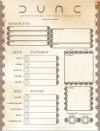Voros
Doomed Investigator
- Joined
- Sep 23, 2017
- Messages
- 15,116
- Reaction score
- 32,956
Assuming Dune is anything like the other Modiphius 2d20 games, your dice pool for tasks ranges between 2 and 5 dice. That's not exactly an intellectual challenge to calculate, at least for me.
Combat Dice / Challenge Dice pools can get bigger, but I'm not sure Dune has an equivalent to those.
Pretty sure that's just a joke on Baulderstone's part. One reason I'm interested in this is not only my love for Dune but to see how they've adapted the system to the setting.
I have no issues with 2d20 myslef I just think it has been over-applied to settings/genre where the fit seems awkward, it also has tended towards a smidgen more crunch than I like. But I could see how a stripped down version (from the Twitter review thread it sounds like combat has been appropriately simplified) could be a good fit for Dune.





 !
!